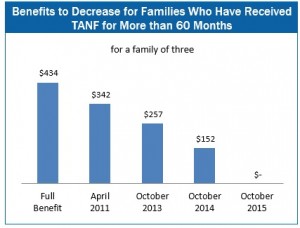What will happen to the thousands of poor families with children whose income assistance benefits were just cut to $152 a month, at a time when job opportunities for DC residents without a college degree are scarce? This is a question the DC Council has been wrestling with since the summer, and it will be the topic of a DC Council hearing today. Legislation being considered gives the District a chance to avoid steep income cuts that will push more families into deep poverty.
 The District adopted plans in 2010 and 2011 to reduce and eventually eliminate income benefits under Temporary Assistance for Needy Families (TANF) ‘ DC’s welfare-to-work program ‘ for families on aid more than 60 months. This was done without protections many states use to extend benefits for families who are likely to face hardship if their income drops.
The District adopted plans in 2010 and 2011 to reduce and eventually eliminate income benefits under Temporary Assistance for Needy Families (TANF) ‘ DC’s welfare-to-work program ‘ for families on aid more than 60 months. This was done without protections many states use to extend benefits for families who are likely to face hardship if their income drops.
Under DC’s plan, TANF cash assistance benefits were cut for about 6,000 families this month, to $152 a month for a family of three. Many members of the DC Council expressed concern about these deep cuts during deliberations earlier this year over the DC budget. An amendment to delay the cut failed by one vote, mainly because TANF job training would have been cut to pay for it.
The Council’s concerns are well placed. One out of every 10 DC residents already has income below half the poverty line — or under about $9,000 for a family of three. New neuroscience research shows that poor children are more likely to suffer from “toxic stress” that disrupts the development of the brain, leading to lifelong negative impacts.[1] Children in poverty score lower on tests of cognitive skills, have more behavior problems, are more likely to drop out of school, and are more likely to have a child at a young age.[2] This low level of benefits will also make it difficult for parents to get the most out of TANF employment services because they will be worrying about how to meet their kids’ most basic needs.
Deep cuts in income assistance to families who already face enormous challenges are likely to lead to even worse family outcomes, including leaving more at risk of homelessness. By supporting families that need the most help, the Council can instead put them on a path to greater independence.
To print a copy of today’s blog, click here.
[1] The Long Reach of Early Childhood Poverty: Pathways and Impacts: Q&As with Drs. Greg Duncan, Katherine Magnuson, Tom Boyce and Jack Shonkoff. Harvard University’s Center on Child Development developingchild.harvard.edu/index.php/download_file/-/view/623/“Ž
[2] The Foreseeable Harm from Governor Brown’s Proposal to Reduce CalWorks Grants for Children by Michael Herald and Jessica Bartholow. March 2011.
